Northern Ireland welfare reform debate goes ahead
- Published
It is expected the welfare reform bill will be blocked, as Gareth Gordon reports
Northern Ireland Assembly members are debating the final stage of the controversial welfare reform bill.
It is proceeding despite Northern Ireland First Minister Peter Robinson's admission to hospital with a suspected heart attack on Monday.
However, it is expected the welfare reform bill will be blocked.
Sinn Féin and the SDLP have signed a petition of concern, which means the bill will not get the necessary cross-community support.
Green Party leader Steven Agnew has also signed the petition.
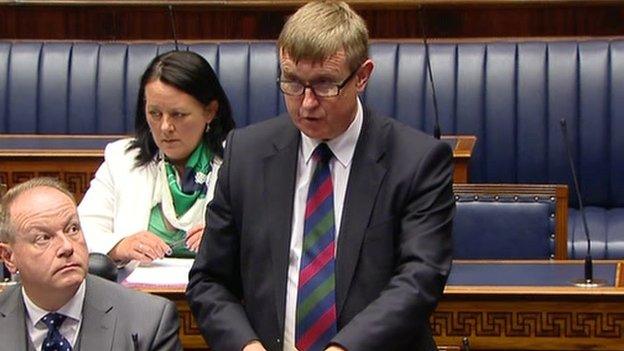
Social Development Minister Mervyn Storey of the DUP moved the bill on Tuesday
He said: "There have been no significant changes to what has been proposed and this has left me with no option but to sign a petition of concern."
The debate comes a day after Mr Robinson, 66, was taken to the Ulster Hospital, Dundonald. The leader of the Democratic Unionist Party was then transferred to Belfast's Royal Victoria Hospital (RVH) where he underwent a procedure.
But DUP sources told the BBC the first minister's illness did not change the urgent nature of the deadline facing the Stormont parties for agreeing a budget.
Social Development Minister Mervyn Storey of the DUP moved the bill on Tuesday, even though nationalist opposition means his measure looks doomed.
Mr Storey told MLAs that the "time for talking" was over.

What is a petition of concern?
The measure was designed as a way to safeguard minority rights in Stormont's power-sharing assembly.
If a petition of concern is presented to the assembly speaker, any motion or amendment will need cross-community support.
In such cases, a vote on proposed legislation will only pass if supported by a weighted majority (60%) of members voting, including at least 40% of each of the nationalist and unionist designations present and voting.
Effectively this means that, provided enough MLAs from a particular community agree, that community can exercise a veto over the assembly's decisions.

"Now is the time for decisions, for getting on with the implementation of reforms," he said.
He said there was a "tremendous responsibility on this House", adding "either we adopt the bill... or we don't and give way to an immensely worse outcome for those we serve".
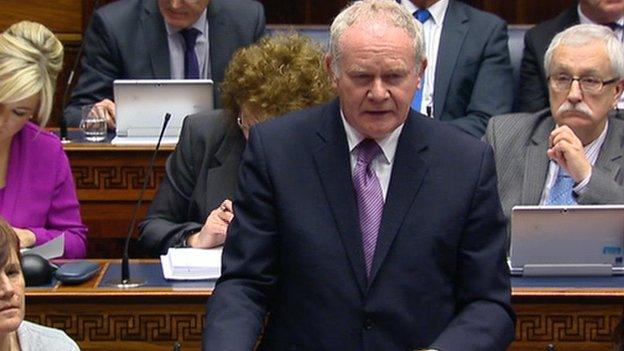
Martin McGuinness said his party's concerns were "bigger than the issue of welfare".
Deputy First Minister Martin McGuinness said the political institutions in Northern Ireland were facing a growing crisis.
He said Sinn Féin concerns were "bigger than the issue of welfare".
"Our concern is wider than that. It's around the grave implications of further cuts threatened by the Tories."
The SDLP's Dolores Kelly said the threat of fines from the government over welfare reform was like a "gun put at our head today, metaphorically".
Mrs Kelly said it was not too late for the parties to get around a table "and thrash out all of the concerns we have" over welfare reform.
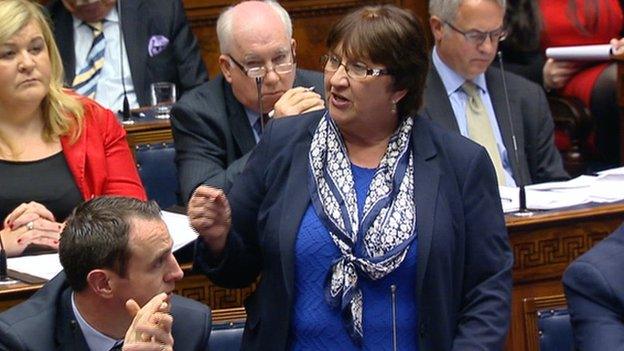
Dolores Kelly urged the parties to get around a table and thrash out concerns
Ulster Unionist Roy Beggs said it was "the most difficult and controversial bill" that the assembly has debated in recent times, and his party did not favour all its contents.
"We do have choices. If this bill is not approved we will be the only part of the UK using the old benefits system, there will be less funds in many other public areas," he said.
"Let's be clear - there's no money tree, there's no going back asking for more money. We've been there lots of times over the past three years.
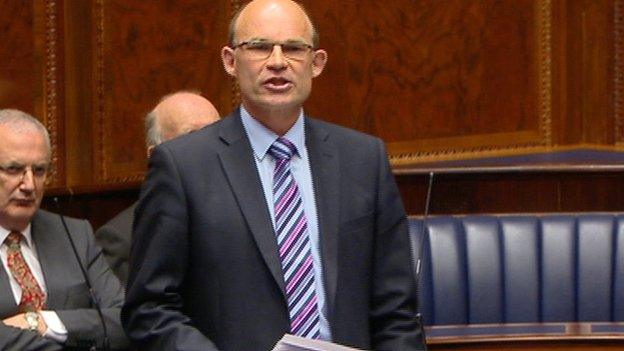
Roy Beggs said the UUP did not favour all the contents of the bill
Alliance Party leader David Ford said while his party opposed many parts of the bill, they would nonetheless support its passage.
"We have to live within the administrative possibilities, we have to live within the financial realities," he said.
He added: "The reality is that if we do not agree this bill, we have the prospect of full blooded Tory cuts with no amelioration whatsoever," he said.
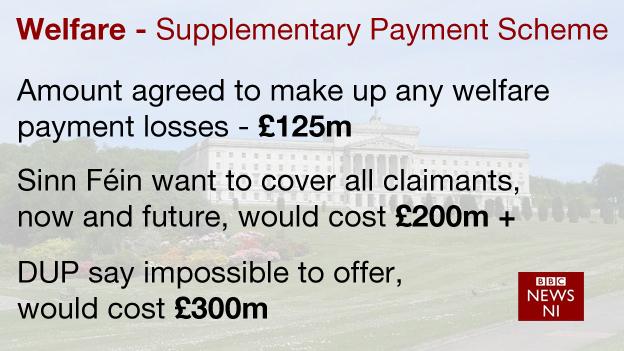
Gregory Campbell, of the DUP, said: "What we have is not perfect. It is rather imperfect."
"Do we sit tight and then it gets worse because that's what's going to happen, it's going to get worse," he said.
"Or do we adopt the better way and try to mitigate against the worst excesses of a welfare reform system that everybody else in the UK admits is better than what they have?"
First and Deputy First Ministers' Question Time was dropped from business on Tuesday due to Mr Robinson's illness.
The assembly has now been suspended until 14:00 BST.
Ahead of the debate, Finance Minister Arlene Foster of the DUP said: "The choice is very clear today, we either back the bill or we allow the bill to fall, which means that all of those top-ups that were negotiated will fall, the conditional support will fall, we'll continue to have to have the levies, the fines from Westminster of £9.5m per month currently - and those are going to increase.
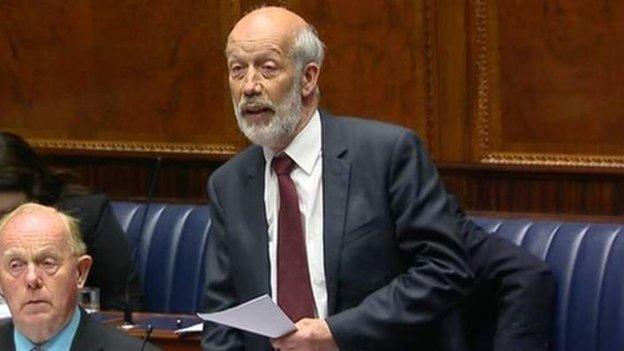
Alliance Party leader David Ford said while his party opposed many parts of the bill, they would nonetheless support its passage
"And of course we have a £600m pressure in relation to our budget.
"But Sinn Féin knows what the choice is. Everybody's walking into this bill today and they know the consequences if they don't back the bill."
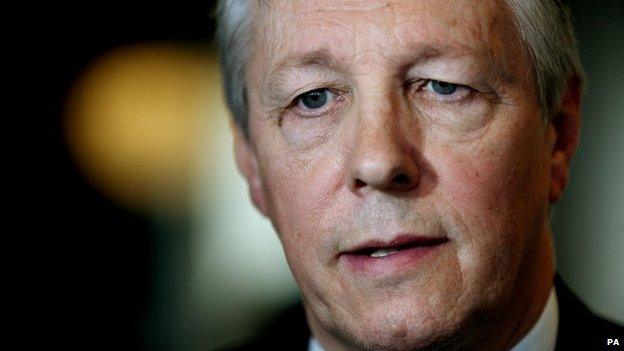
Peter Robinson is in a stable condition in hospital, his party has said
Presuming the bill is rejected later on Tuesday, the executive faces a difficult situation, with the Finance Minister, Arlene Foster, calculating the Stormont departments will have to deal with around £600m in cuts.
BBC Northern Ireland political editor Mark Devenport says that assuming the parties cannot agree to impose such a budget, the Northern Ireland Office may face fresh pressure to intervene.
Last week, Mr Robinson warned that the assembly could not survive the scenario that would unfold if the welfare reform bill was not approved.
The Northern Ireland parties had agreed a deal on Westminster's welfare reform in the Stormont House Agreement last December.
However, Sinn Féin withdrew its support for the bill in March.
- Published21 May 2015
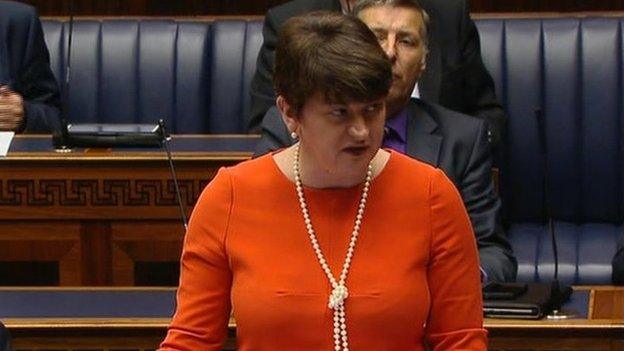
- Published26 May 2015
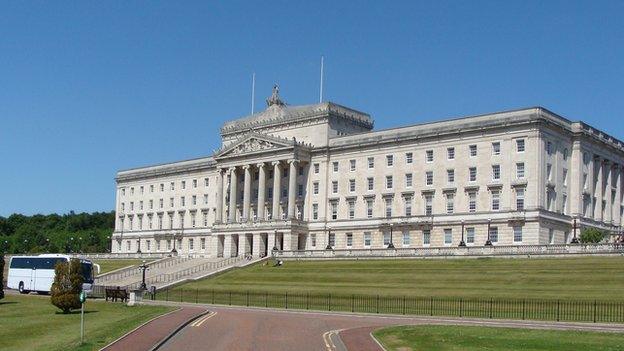
- Published24 May 2015

- Published26 May 2015
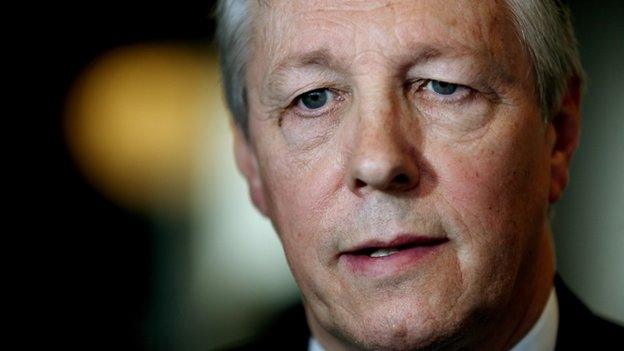
- Published10 March 2015

- Published22 May 2015
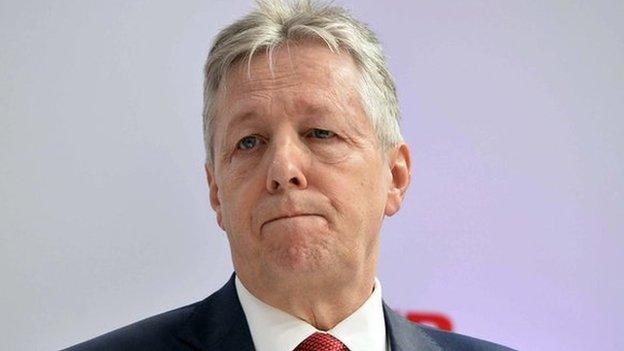
- Published22 May 2015
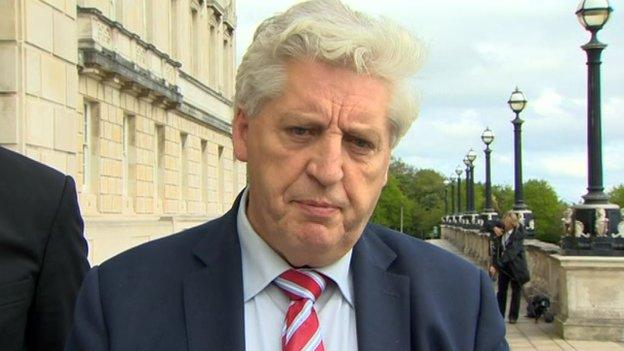
- Published26 May 2015